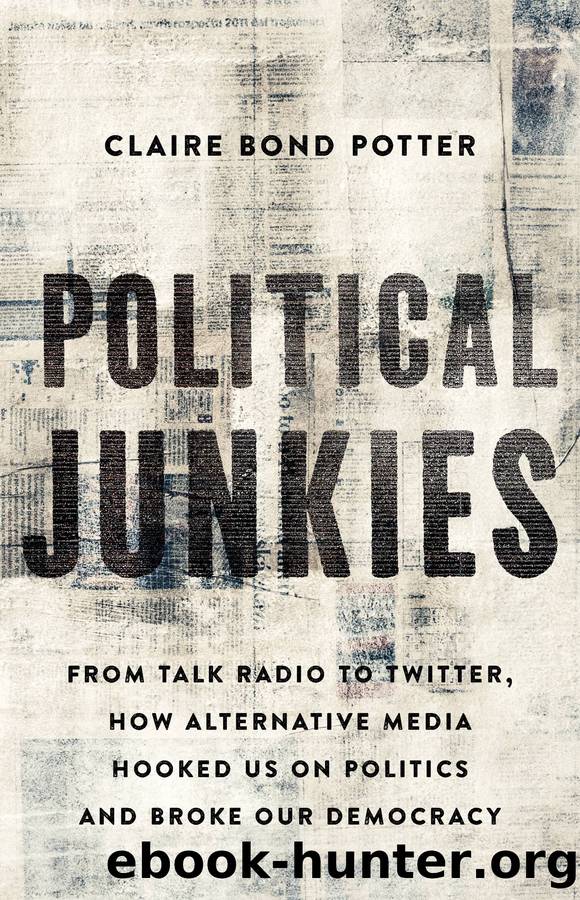Political Junkies by Claire Bond Potter

Author:Claire Bond Potter [BOND POTTER, CLAIRE]
Language: eng
Format: epub
Publisher: Basic Books
Published: 2020-07-07T00:00:00+00:00
8
MYBARACKOBAMA
In 2008, the unstated question was: Would the next Democratic candidate be the first woman, or the first African American, to be nominated by a major party? On January 5, toward the end of the final New Hampshire debate, the three remaining male candidates battered New York Senator Hillary Clinton all evening.1 The moderator, ABC News anchor Charles Gibson, then asked Clinton what she would say to voters who did not find her likable. “They seem to like Barack Obama more,” Gibson elaborated as the auditorium grew tense. Clinton acquired a bright, slightly fragile smile and took a deep breath. “Well that hurts my feelings,” Clinton answered, as the crowd began to laugh.
“I’m sorry, Senator—I’m sorry,” Gibson backpedaled.
“But I’ll try to go on,” Clinton continued with a comic headshake. “He’s—he’s very likable. I agree with that.” Obama stared down at his notes as the audience laughed. “I don’t think I’m that bad,” she appealed. The crowd began to applaud, as the camera switched back to Obama.
“You’re likable enough, Hillary, no doubt about it,” the junior senator from Illinois cut in curtly.
“I appreciate that,” Clinton said brightly, in her best Midwestern “nice” voice, as the audience applauded loudly.2
Women voters were particularly outraged by the exchange. They heard Obama’s faint praise as a put-down, the kind that jocks use to humiliate unpopular, brainy, high school girls. And when, the day before New Hampshire voted, Clinton seemed to hold back tears at a campaign stop, sympathy for her grew.3 “This wasn’t 1972,” veteran media consultant David Axelrod later wrote, emphasizing how quickly the television clip had migrated from a local news station to YouTube, then posted to the progressive blog Talking Points Memo, where thousands of views made it news, pushing it onto cable and mainstream evening broadcasts. Although Obama had been between 11 and 14 points up in the polls, momentum abruptly shifted to Clinton. New Hampshire handed the former First Lady a surprising three-point win; women voted for Clinton by a 13-point margin.4
By 2008, digital alternative media encompassed more than just campaign tools or networks of political blogs: 44 percent of all adults went online for their political news during the 2008 campaign, as many as read newspapers. Fewer Americans turned to magazines, while sharing news electronically was on the rise. Younger voters were “not just consumers of news and current events, but conduits as well,” wrote New York Times reporter Brian Stelter, “sending out e-mailed links and videos to their friends and social networks.” Only 25 percent of voters under 30 turned to television for campaign news, compared to 40 percent in the 30- to 49-year-old bracket and 50 percent who were older than 50. Two-thirds of web users under 30 used social networking sites, and 4 out of 10 watched campaign events and speeches on YouTube. In retrospect, the outcome of the 2008 election was foretold by new statistical categories: “friends,” “followers,” and “likes.” Obama had one million followers on the two top social media sites, MySpace and Facebook; his Democratic rival, Clinton, 330,000, and John McCain, the Republican nominee, 140,000.
Download
This site does not store any files on its server. We only index and link to content provided by other sites. Please contact the content providers to delete copyright contents if any and email us, we'll remove relevant links or contents immediately.
The Secret History by Donna Tartt(16627)
The Social Justice Warrior Handbook by Lisa De Pasquale(11489)
Thirteen Reasons Why by Jay Asher(7788)
This Is How You Lose Her by Junot Diaz(5775)
Weapons of Math Destruction by Cathy O'Neil(5038)
Zero to One by Peter Thiel(4824)
The Myth of the Strong Leader by Archie Brown(4789)
Promise Me, Dad by Joe Biden(4449)
Beartown by Fredrik Backman(4420)
Stone's Rules by Roger Stone(4417)
How Democracies Die by Steven Levitsky & Daniel Ziblatt(4399)
The Fire Next Time by James Baldwin(4343)
100 Deadly Skills by Clint Emerson(4079)
A Higher Loyalty: Truth, Lies, and Leadership by James Comey(4033)
Rise and Kill First by Ronen Bergman(4012)
The David Icke Guide to the Global Conspiracy (and how to end it) by David Icke(3883)
The Farm by Tom Rob Smith(3872)
Secrecy World by Jake Bernstein(3783)
The Doomsday Machine by Daniel Ellsberg(3732)
